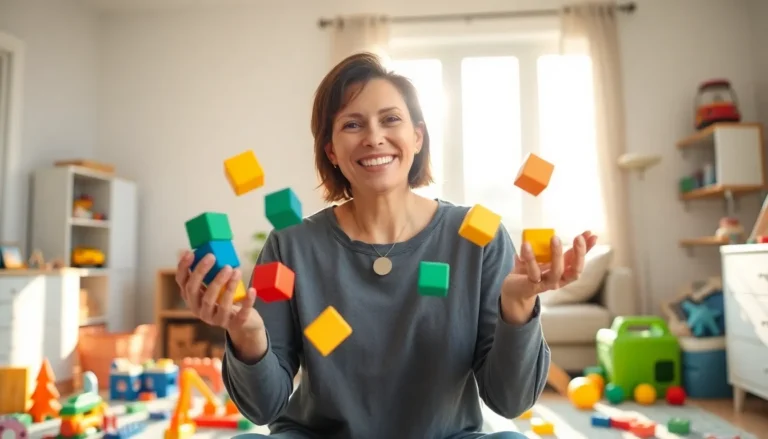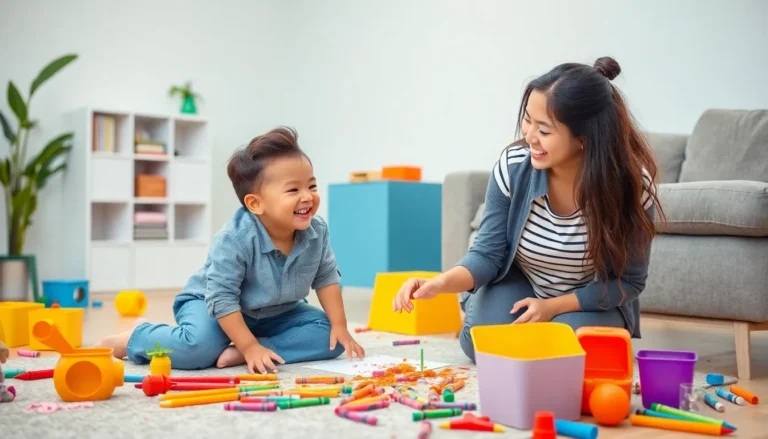Table of Contents
ToggleIn the wild world of parenting, where chaos reigns and sanity often takes a backseat, bad parenting memes have emerged as the hilarious lifeline many parents didn’t know they needed. These memes capture the absurdity of everyday parenting struggles, turning moments of frustration into shared laughter. After all, who hasn’t faced a meltdown over broccoli or a toddler tantrum that could rival a Shakespearean drama?
Understanding Bad Parenting Memes
Bad parenting memes serve as a humorous reflection of the challenges faced by parents. These memes capture the chaos of parenting, allowing parents to connect over shared experiences.
Definition of Bad Parenting Memes
Bad parenting memes combine humor and relatability, often highlighting the absurdities of parenting. They depict situations like skipping vegetables or navigating tantrums, showcasing realistic parenting struggles. Parents frequently share these memes on social media, creating a sense of camaraderie. With relatable images and captions, these memes resonate with a wide audience, emphasizing that imperfection is part of the parenting journey.
Origins and Trends
Bad parenting memes emerged alongside the rise of social media. Platforms like Facebook and Instagram enabled parents to share their humorous takes on raising children. Trends often evolve from common experiences, making them relevant for various parenting styles. Memes reflect societal shifts, such as the acceptance of imperfect parenting. As parents face new challenges, these memes adapt, maintaining their appeal through relatable content. These trends establish a community where parents find solace in laughter amid the chaos of family life.
Types of Bad Parenting Memes

Bad parenting memes come in various types, each highlighting different aspects of the parenting journey. They depict both relatable situations and satirical humor, appealing to a broad audience of parents.
Relatable Situations
Relatable parenting situations resonate with many. Parents often find themselves in battles over meals, clothes, and sleep routines. Memes that portray the frantic mornings of getting kids ready for school or the chaos of grocery shopping with toddlers strike a chord. These moments capture the messy reality of parenting, encapsulating feelings of frustration or exhaustion. They remind parents they aren’t alone in navigating daily dilemmas. Shared frustrations create a sense of community, leading to laughter and support. Such memes often prompt parents to tag friends, fostering conversations about their collective struggles.
Satirical Humor
Satirical humor shines through in many bad parenting memes. Parents use exaggeration and irony to mock common parenting challenges. For instance, memes about “perfect parenting” standards reveal the ridiculousness of societal expectations. These humorous takes showcase the absurdity of striving for perfection while raising children. Often, parents laugh at themselves through these portrayals, acknowledging their imperfections. Such memes invite everyone to embrace the chaos and imperfections inherent in parenting. By highlighting outrageous scenarios, these memes create a space for reflection and laughter. They help alleviate stress, encouraging healthier perspectives on parenting realities.
The Impact of Bad Parenting Memes
Bad parenting memes offer insights into parenting challenges while providing comic relief. These humorous images resonate deeply with parents, fostering connections through shared frustrations.
Social Commentary
Social commentary emerges through bad parenting memes by reflecting societal standards. These memes question conventional views on parenting, challenging the notion of perfection. Humor illustrates the absurdity of expecting flawless child-rearing, allowing parents to feel validated in their struggles. Parents often share exaggerated situations, revealing their experiences in a lighthearted manner. This commentary sparks conversations around the realities of parenting, encouraging openness about imperfections. By capturing relatable moments, memes serve as a tool for social reflection, making it easier for parents to bond over shared dilemmas. This exchange promotes a broader understanding of parenting, emphasizing community support and realism.
Community Reactions
Community reactions to bad parenting memes highlight the collective experience of raising children. Parents often express gratitude for relatable content, appreciating shared humor that lightens daily challenges. Engagement on social media platforms showcases how memes spark discussions and provide emotional support. Many parents comment on mutual frustrations, reinforcing a sense of camaraderie. The laughter generated fosters a unique sense of belonging, helping parents feel less isolated in their journeys. As communities form around these memes, parents share tips and advice, further enhancing connections. This collaborative environment encourages acceptance of the chaotic elements inherent in parenting, strengthening bonds among families navigating similar paths.
Creating Your Own Bad Parenting Memes
Creating bad parenting memes requires a blend of humor and relatability that resonates with fellow parents. Parents often find inspiration in their daily challenges. By highlighting awkward moments, these memes capture the essence of parenting’s chaos.
Tips for Memes that Resonate
Understand your audience’s experiences by focusing on universal struggles. Use clear images that depict relatable scenarios, such as chaotic mornings or grocery trips with kids. Incorporate witty captions to enhance humor and provide context. Humor often feels more impactful when it’s succinct. Keep text minimal but expressive to ensure immediate engagement. Encourage interaction by posing questions in captions, prompting parents to share their own experiences.
Platforms for Sharing
Social media platforms like Facebook and Instagram serve as ideal stages for sharing bad parenting memes. Consider using Pinterest for visual storytelling, where parents scroll for relatable laughs. Twitter captures short, punchy jokes that can quickly go viral. Engage communities on parenting forums or subreddits where memes can reach specific audiences. Explore TikTok for dynamic content combining visuals and humor, appealing to a younger parent demographic. Tailor your sharing strategy based on each platform’s strengths to maximize audience reach.
Bad parenting memes have become a staple in the parenting community. They provide not just laughter but also a sense of belonging for parents facing similar challenges. By embracing the chaos and imperfections of parenting through humor, these memes foster connections that help lighten the load of daily struggles.
As trends evolve and new challenges emerge, the relatability of these memes continues to resonate deeply. They serve as a reminder that no parent is alone in their journey. In a world filled with expectations, bad parenting memes encourage acceptance and camaraderie, making the wild ride of parenthood a little more enjoyable.








